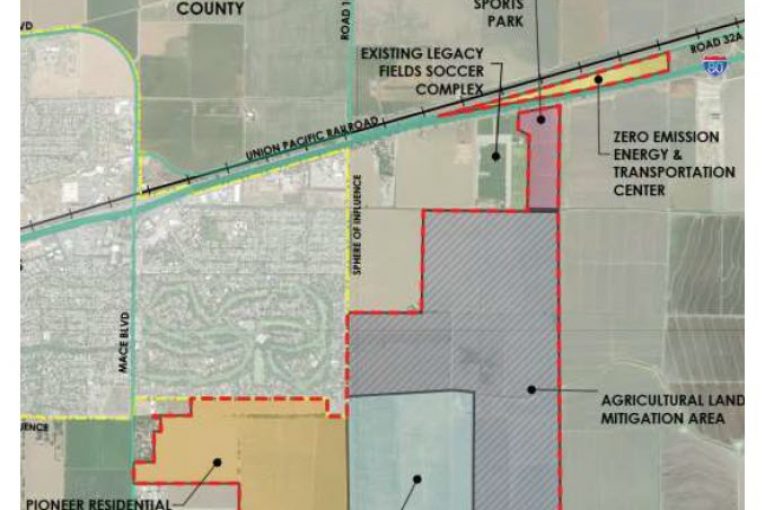
 By David M. Greenwald
By David M. Greenwald
Executive Editor
Davis, CA – On Thursday, the Vanguard reported that Pioneer pulled its project. It’s a pretty pointed letter that blames the city, citing “anticipated delays and unreasonable obstacles in obtaining the necessary approvals cannot justify our continued investment.”
The city pushed back, noting that they sent a letter on September 15, 2023, that garnered no response.
A number of people both publicly and privately tried to argue that the loss of Pioneer is not that big a deal. They have a point. It seemed unlikely that the project would have succeeded in the difficult market that Davis has been for the last 25 years, where projects not only have to navigate a minefield of obstacles at the city and community level, but at the end of that difficult process there is a vote of the people—which only two projects have thus far been able to navigate.
Most of the pointed comments by the developers were focused, however, at the stage before any of that comes into play.
They note, “The Legislature’s efforts to address the housing crisis will continually fall short when local jurisdictions fail to timely process or dedicate adequate staff  for housing applications and ultimate approval remains unpredictable even after substantial capital is invested in exhaustive environmental review.”
for housing applications and ultimate approval remains unpredictable even after substantial capital is invested in exhaustive environmental review.”
They continued, “Despite the availability of land and forward thinking developers ready to take meaningful strides to build housing, the unreasonable and arbitrary obstacles in the approval process will prolong the state’s housing crisis.”
They added, “Thank you for your limited efforts in reviewing the preliminary application and we hope the City Council will take the opportunity to reconsider how it can provide adequate staffing and direction so that the City can actually achieve a compliant Housing Element and, more importantly, additional housing opportunities.”
I understand the city’s response—but I think all of us should be concerned with how many of these projects have been pulled before they even get very deep in the process.
My biggest concern is the overall math.
The city has some time right now to fix things—but not really that much time. There will be new RHNA numbers coming forward by 2027 or 2028 to guide us for what the next part of the process is likely to be.
But, as of now, there are really just two peripheral projects coming forward—Village and Shriners—a combined 3000 units. Already opponents are aiming their sites on the first of these projects to move forward, Village.
Palomino Place at this point will avoid a Measure J vote, but also is not going to move the needle much overall on housing.
A big problem that the city faces is that, without Pioneer, the city would have to pass both peripheral projects and find a way to increase the number of affordable units. That’s assuming a requirement of 2000 market rate and 1000 affordable—similar to this time as opposed to a more aggressive 4000 and 2000 which trends suggest could happen.
How the city is going to meet those requirements is anyone’s guess at this point.
Those who operated under the belief that the state would start to back off on the housing I don’t think will be proven correct.
We have seen in recent weeks the state filing lawsuits against jurisdictions for failing to adhere to state housing law, the state has pressured communities through the courts to adhere to the builder’s remedy, and they recently decertified one Housing Element when the community fell out of compliance with it.
Last fall, the city all but acknowledged it is going to have to go peripheral with the next housing element.
In December, then-Mayor Will Arnold warned, “I would just say to those who have said that we will be able to meet our next RHNA cycle numbers without going outside of the city limits… I suggest they tune in or watch the recording of this meeting as we really try to meet our current requirements simply with infill and the difficulty we’re having in doing so.”
If there is a recognition on the part of the community that the current way of doing things is no longer going to work, it doesn’t seem to have really sunk in.
The city has a little time to figure this stuff out through the next General Plan Update and a possible revision to Measure J—but not much. The margin for getting the last housing element approved was razor thin, the margin for keeping it certified is razor thin, but the margin for the housing element might be non-existent with the loss of Pioneer.
Without a pretty drastic change of direction in the next few years, it is only a matter of time before someone challenges Measure J and increasingly likely prevails.
Nothing is set in stone yet, but clearly the city and community should be on notice that we cannot continue to practice business as usual.







Your writing is so weird because you have always supported Measure J. Even today you write as if Measure J going down would be a bad thing while at the same time lamenting another housing project being abandoned because of Measure J. You seem to want it both ways. Your continued inconsistency undermines your credibility.
You’re missing at least three points here.
Point 1: Who is the audience? The audience are the 83 percent of people who voted for Measure J not the 17 the percent who didn’t.
Point 2: The piece is in part written in response to those who said yesterday, “eh well, Pioneer wasn’t going to pass anyway”
Point 3: And maybe most important, how many projects never even get to a Measure J vote? With all your focus on Measure J, I think we should look more at the pre-Measure J process as well.
Ron
You are missing the subtly of David’s point. He no longer supports Measure J/R/D as written, but he (and I) recognizes that Measure J is unlikely to be completely abolished through a popular vote. You’re naive if you believe that is a likely or even possible outcome. It is possible to see a modification that might be acceptable to the electorate, especially if the alternative is complete abrogation of by the state.
I guess the difference is you guys know better but think you should pussy foot around while I’m speaking truth to power.
My question for you is how is your strategy working? The City Council was working on goals the other night. Where was reforming Measure J on the to do list?
The most likely outcome is if the next project fails or the city cannot produce sufficient housing, the state will come in and attempt to get Measure J nullified. I happen to believe that is the ONLY path by which J would actually be abrogated.
I think the City Council is in crisis mode over housing. So they (at least the ones that might support reforming Measure J) probably didn’t want to cloud the waters with trying to convince the public to make changes that take away their direct (meddling) input in the planning process. The Council probably has a singular focus at this point to get housing approved to meet the RHNA goals and avoid any civic penalties. It makes sense from a political standpoint but unfortunately it means it may be a long while (if at all) that any reform happens to Measure J.
Do you disagree with my analysis?
I don’t disagree that it wasn’t likely to pass, I think however that part of the problem.
So, just to clarify: you don’t think the voters should have a say as to whether a large peripheral development should go forward on farmland south of Davis?
I don’t think voters should have DIRECT say as to whether a large peripheral development should go forward on farmland south of Davis?
I think voters should have their say on these matters through the city council members they vote in to office. Voters generally aren’t good at long term planning that has lots of moving parts and many considerations. That’s why they elect leaders to lead.
Until they finally get tired of their elected leaders leading them in directions they don’t want to go, at which point they exercise their long-range planning skills by enacting Measure J.
Then they should elect new leaders.
If you don’t like how your food is prepared at a restaurant, you don’t go into the kitchen and cook it yourself. You go to another restaurant the next time. If you disagree with your doctor’s opinion about a serious medical diagnosis or treatment; you don’t treat yourself…you get a second opinion/new doctor.
But the Davis community has a trumped up sense of it’s own abilities to DIRECTLY manage themselves. It’s as if having a PhD. in particle physics pharmacology and an undergrad degree in underwater basket weaving grants you magical knowledge and insight into urban planning and finance. But it doesn’t matter how “smart” you are if you don’t spend your time researching all of the details about urban economic development, urban planning, state mandates….etc.. I have direct knowledge and experience in some these areas and I’m not sure I’m qualified to make direct decisions over city land use and finance. Why? Because I spend my most of my off time running around with two kids in multiple sports at the same time or managing elderly parents…or any of a dozen other things. Most of the time I have little time to research (even with my experience and knowledge in urban planning and finance) and study what’s going on in Davis in any detail necessary to make an informed direct decision.
You’re speaking opinion to power. An opinion that is not shared by a majority of the voting public.
Everyone here has voiced some good points, but as to the subject of the post, it seems to me that the developers gave up pretty quickly and easily for a development that was at best hodge-podgey and totally vehicle centric sprawl. I’ve been voting yes on every proposal lately and this one had a bad smell. So not sure it’s demise is a good test of any kind of policy crisis.